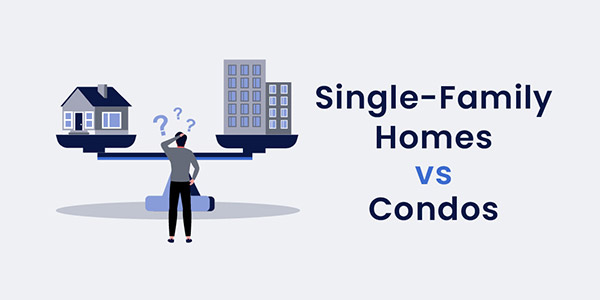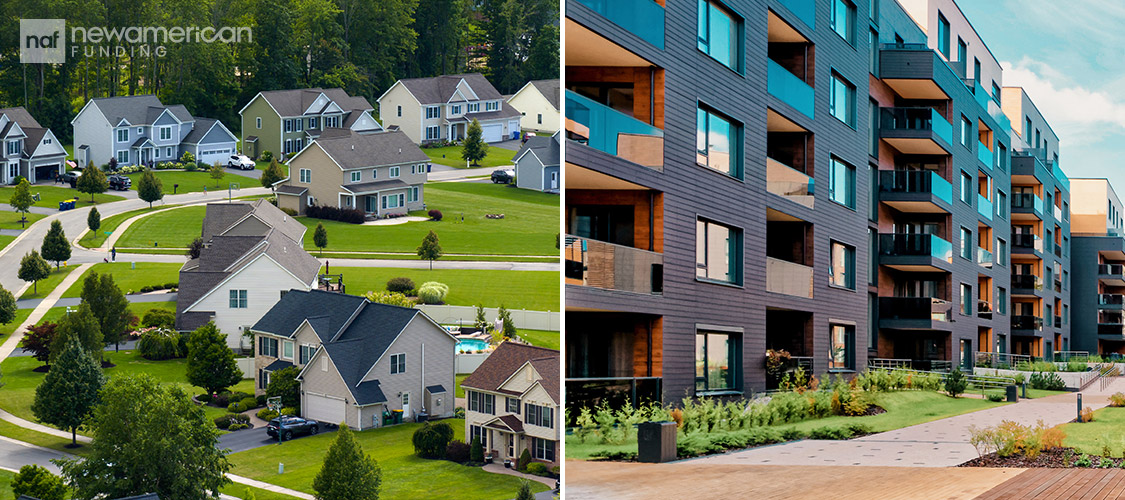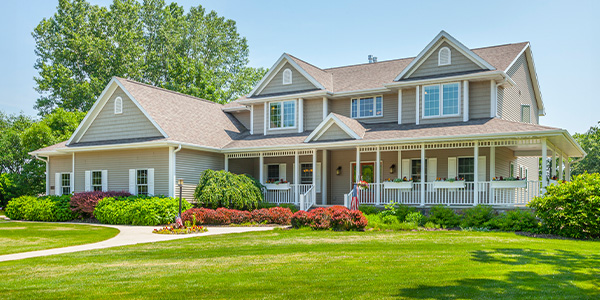Homebuyers
Comparing Single-Family Homes vs. Condos
February 9, 2024
When you first begin to explore the housing market, you will come across many types of properties. Two of these options that homebuyers can choose between are single-family detached homes and condominiums. Both options offer you the opportunity to own your own home, build equity, and customize your home to reflect your needs and style. However, there are several important differences between the two that homebuyers should consider before deciding on what to buy.
Demand for single-family homes and condos in the market
The real estate market saw a surge in demand for single-family homes during the early stages of the pandemic. Several factors contributed to this. As the pandemic spread, people began seeking more living space away from shared community spaces. At the same time, there was a rise in remote work. People had the flexibility to change locations, in many cases without sacrificing their financial stability, allowing them to move to homes that fit their current needs. With more members of the family working together outside the home, space became a more immediate priority.
As the disruptions caused by the pandemic lessened, demand for condos returned. Some workers began to return to offices, and as shared spaces became safer for many, the desire for the amenities that come with city life came back.
Pros and cons of single-family homes and condos
Pros of single-family homes
- More space: Single-family homes typically offer more space. They often include a yard, and there is more distance between your home and those of your neighbors.
- Greater geographic flexibility: While condos do make up a significant percentage of the current inventory, their availability is often limited to cities. Single-family homes are available across the country, both in urban and more rural or suburban areas.
- More freedom: Single-family homes can give homebuyers more freedom to modify and customize their property.
- More privacy: Single-family homes offer more privacy than condos since they are not communal living spaces. In the same way, you have more space from neighbors in a single-family home, you also have more privacy.
- Easier to sell: Single-family homes usually do not have neighborhood limitations on when or how you can sell your home.
Cons of single-family homes
- More upkeep: Unlike condos, single-family homes require you to manage and address all potential maintenance issues both in the house and on the property itself. This means you are responsible for repairs and upkeep, either by learning how to maintain things yourself or by hiring professionals to come in and do it for you.
- Higher prices: Single-family homes are usually more expensive than condos, but this can vary depending on location.
- Potentially less community
Pros of condos
- Accessible community: The way condos are built means that you share more immediate space with more people. While single-family homes offer you space from your neighbors, it can also be more difficult to connect with them. Sharing space and amenities with your neighbors makes it easier to get to know and potentially connect with your immediate community, which can offer security and fulfillment.
- Included amenities: Condos often offer included amenities that you might not be able to afford with a house. These can include a pool, a gym or fitness center, a shared dog park for your pet, or even things like a theater room, depending on the building.
- Less upkeep: The specifics of condo upkeep vary based on the building and the homeowner association (HOA) agreements, but generally you won't be responsible for outside maintenance like the lawn, gutters, or amenities like the pool. Additionally, the HOA sometimes takes care of the more comprehensive interior maintenance tasks, such as electrical work.
- Potentially more affordable: When it comes to pricing, condos are generally less expensive than single-family homes in terms of the overall purchase price. The median sale price for condos is $341,000, compared to $419,000 for single-family detached houses. This affordability makes condos an attractive option for homebuyers with limited down payment funds.
It's important to note that condos are typically smaller in size than single-family homes. When considering the price per square foot, single-family homes offer more value, with a median price of $315 per square foot compared to $221 per square foot for condos.
Cons of condos
- Less privacy: In the same way that condos offer you a more accessible community, they also offer less privacy. Without much space separating you from your neighbors, it can be more difficult to maintain boundaries and feel like you have a private space that's your own.
- More fees: While HOAs do exist with single-family homes, they are more likely with condos because of the shared space. HOA fees can be expensive, though, in a well-managed HOA, they are used for things like upkeep and maintenance.
- More restrictions: In addition to fees, an HOA will likely impose rules and regulations that you'll have to follow to live in the condo. This may include things like pet restrictions, parking requirements, and noise ordinances.
Availability of single-family homes vs condos
One of the main difficulties of the present housing market is a lack of inventory. The influx of new construction on the market has been talked about as a solution to this problem, but condos may present an alternative for certain homebuyers.
While the inventory for single-family homes is still low, condo inventory levels have increased. In December, condo inventory levels increased by 9% year-over-year. This means that there is approximately 9% more condo inventory on the market than there was in December of 2022. Condos accounted for 13.1% of the national housing inventory, this is notably higher than their historic levels of 10%-11.5%.
As condo inventory continues to grow, they remain an attractive option for first-time homebuyers and people who are looking to downsize. As mentioned earlier, condos are often cheaper than single-family homes, don't usually offer as much space, or require the same upkeep. For first-time homebuyers, condos can sometimes be a more accessible and manageable way of entering into homeownership. However, while the inventory of condos has risen, this does not guarantee their availability in all locations.
While condos offer a larger share of current available inventory in many markets, they may not be readily available across the country. In certain areas, such as densely populated and vacation destinations, condos can make up a significant proportion of for-sale listings. Florida stands out as a prime example, with eight of the top 15 markets for condo inventory levels located in the state. Cities like Miami, Fort Lauderdale, West Palm Beach, and Naples have condo shares exceeding 40% of the inventory. However, in many markets, condos represent a relatively small slice of the housing options available.
Whether you want to choose a single-family home or a condo as you start your homebuying journey will depend on your unique needs and goals. As with all big decisions, you'll want to consider lifestyle variables like your job, income, family needs, and personal goals. Understanding market trends, demand, inventory levels, and pricing differences can help you make an informed choice that aligns with your priorities.
Homebuyer Resources







